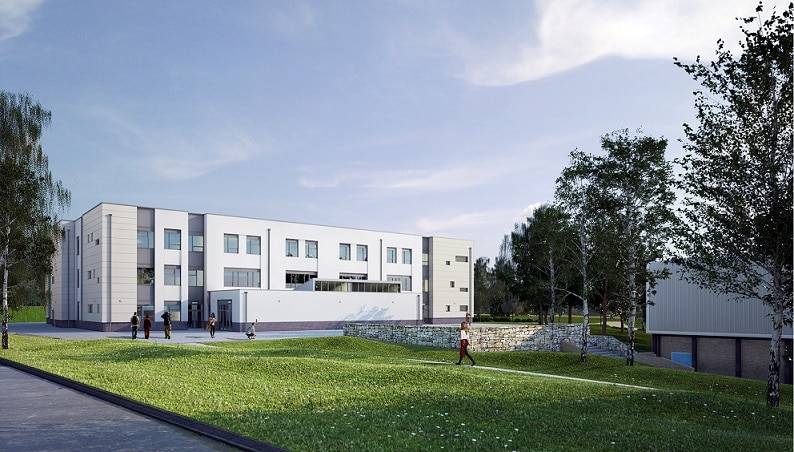Close collaboration between Knauf and Sound Interiors enabled the drylining contractor to cut waste to an industry-leading level of just 9 per cent on a £15 million new school in Rochdale, Lancashire.
 St Cuthbert’s Business & Enterprise College was built as part of the Building Schools for the Future (BSF) programme to cater for 1,400 pupils on behalf of Rochdale MBC. Sound Interiors was awarded a £500,000 drylining package and it was determined to minimise waste because, as contracts manager John Sheeran, put it: “This is where the job can be won or lost”.
St Cuthbert’s Business & Enterprise College was built as part of the Building Schools for the Future (BSF) programme to cater for 1,400 pupils on behalf of Rochdale MBC. Sound Interiors was awarded a £500,000 drylining package and it was determined to minimise waste because, as contracts manager John Sheeran, put it: “This is where the job can be won or lost”.
Mr Sheeran explained: “It makes sense in three ways: you’re saving on materials; the cost of the manual labour taking waste to the skip and bringing in extra plasterboard; and then on the costs of skips.”
Cutting waste from an average of 15 per cent saved the company more than £2,000 in the cost of skip hire alone, as the waste saving measures reduced plasterboard waste by 19 tonnes or roughly five skips. The company recruited Knauf technical services to help in the initial design, reducing the number of board types from more than 10 to just seven to enable greater flexibility in re-using offcuts.
 It also came to an agreement about storing the offcuts inside the building within dedicated, ‘quarantine’ and ‘recycling station’ areas that had barriers to prevent general access. Normally offcut materials would not be allowed to be stored on site but agreed to the measure in order to reduce waste. Sound Interiors also agreed to take responsibility for the waste, and pay for it, and to use a nominated waste management company.
It also came to an agreement about storing the offcuts inside the building within dedicated, ‘quarantine’ and ‘recycling station’ areas that had barriers to prevent general access. Normally offcut materials would not be allowed to be stored on site but agreed to the measure in order to reduce waste. Sound Interiors also agreed to take responsibility for the waste, and pay for it, and to use a nominated waste management company.
The operatives were also encouraged not use full boards because they were paid an extra 20 per cent for every square metre that they installed using offcuts instead. The size of any offcuts over 300mm was detailed before it went into the storage area, so operatives knew if suitable offcuts were available and were monitored to make sure that they used suitable offcuts and earned their bonuses for using them.
The resulting wastage rate for plasterboard was just 9 per cent, well below the industry average of between 15 and 25 per cent, and cut material costs by circa £8,000. It also delivered environmental savings by reducing the number of deliveries, the resources required during manufacture of the products, and improving efficiencies in site works.


